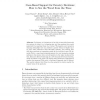Free Online Productivity Tools
i2Speak
i2Symbol
i2OCR
iTex2Img
iWeb2Print
iWeb2Shot
i2Type
iPdf2Split
iPdf2Merge
i2Bopomofo
i2Arabic
i2Style
i2Image
i2PDF
iLatex2Rtf
Sci2ools
74
Voted
ICCBR
2009
Springer
2009
Springer
Case-Based Support for Forestry Decisions: How to See the Wood from the Trees
In forestry, it is important to be able to accurately determine the volume of timber in a harvesting site and the products that could potentially be produced from that timber. We describe new terrestrial scanning technology that can produce a greater volume of higher quality data about individual trees. We show, however, that scanner data still often produces an incomplete profile of the individual trees. We describe Cabar, a case-based reasoning system that can interpolate missing sections in the scanner data and extrapolate to the upper reaches of the tree. Central to Cabar’s operation is a new asymmetric distance function, which we define in the paper. We report some preliminary experimental results that compare Cabar with a traditional approach used in Ireland. The results indicate that Cabar has the potential to better predict the market value of the products.
| Added | 26 May 2010 |
| Updated | 26 May 2010 |
| Type | Conference |
| Year | 2009 |
| Where | ICCBR |
| Authors | Conor Nugent, Derek G. Bridge, Glen Murphy, Bernt-Håvard Øyen |
Comments (0)

